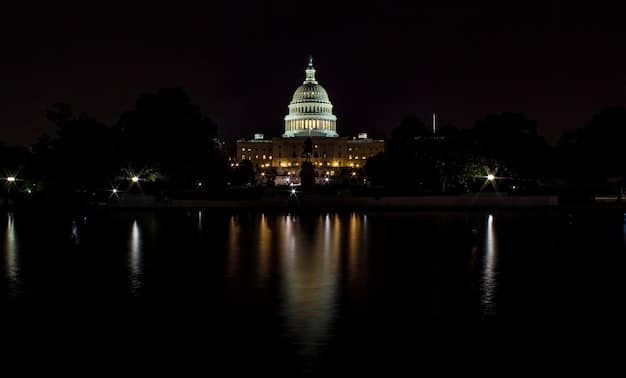Government Shutdown Averted: Congress Strikes Last-Minute Budget Deal

Breaking News: Government Shutdown Averted as Congress Reaches Last-Minute Budget Deal, offering temporary relief and preventing widespread disruption, but crucial funding questions remain for long-term stability.
In breaking news: government shutdown averted as Congress reaches last-minute budget deal, averting what would have been a significant disruption to federal services and the economy. This agreement comes after weeks of tense negotiations and political brinkmanship, leaving many wondering about the details and long-term implications.
Congress Reaches a Budget Agreement: Key Details Unveiled
The last-minute budget deal reached by Congress has averted a government shutdown, bringing temporary relief to federal employees and services. However, understanding the key details of this agreement is crucial to assess its impact.
What’s in the Deal?
The agreement includes provisions for funding critical government functions through a specific date. It also allocates funds to various departments and agencies.
What’s Not Included?
Certain proposals and long-term funding solutions were left out of the deal, leading to concerns about future budget battles.
- Impact on Federal Agencies: The agreement’s effect on different federal agencies varies, with some receiving more funding than others.
- Political Reactions: Reactions to the deal have been mixed, with some praising it as a necessary compromise and others criticizing its shortcomings.
- Economic Implications: The agreement’s economic implications are still being analyzed, but it’s expected to provide short-term stability.

In conclusion, the budget agreement reached by Congress is a complex compromise that addresses some immediate funding needs but leaves many long-term questions unanswered. Understanding the details and implications of this deal is essential for citizens and policymakers alike.
The Political Battleground: Negotiating the Budget Deal
The road to the budget deal was paved with political maneuvering, intense negotiations, and partisan divides. Understanding the political dynamics that shaped the agreement is essential to grasping its significance.
Partisan Divide
The negotiations were marked by significant disagreements between Democrats and Republicans, particularly over spending levels and policy riders.
Key Players
Several key figures played a crucial role in the negotiations, including congressional leaders and White House officials.
The political climate surrounding the budget negotiations was highly charged, with both parties facing pressure from their constituents and interest groups.
- Compromises and Concessions: To reach an agreement, both sides had to make compromises and concessions on their priorities.
- Public Opinion: Public opinion polls reflected a divided electorate, with varying views on the budget and the role of government.
- Future Challenges: Despite the agreement, significant challenges remain in addressing long-term fiscal issues.
In conclusion, the political dynamics that shaped the budget deal underscore the deep divisions in American politics. While the agreement prevents a government shutdown, it also highlights the need for more sustainable and bipartisan solutions to fiscal challenges.
Impact on Federal Employees and Government Services
A potential government shutdown would have had significant consequences for federal employees and the delivery of government services. The last-minute budget deal averted these disruptions, at least temporarily.
Federal Employee Morale
The threat of a shutdown had a negative impact on federal employee morale, with many facing uncertainty about their jobs and paychecks.
Essential Services
A shutdown would have disrupted essential government services, including national security, law enforcement, and public health.

The agreement’s impact on government services varies depending on the agency and the specific provisions of the deal. Some agencies may face budget cuts or staffing shortages, while others may receive additional funding. These variances in funding may result in a slowdown with regular tasks or an increase in the backlog that departments face.
- Economic Impact: A government shutdown would have had a ripple effect on the economy, affecting businesses, consumers, and investors.
- Long-Term Consequences: The threat of repeated shutdowns can undermine public trust in government and hinder long-term planning.
- Alternative Solutions: Finding alternative solutions to budget impasses is crucial to prevent future disruptions.
In summary, the budget deal averts the immediate threat of a government shutdown and its negative consequences for federal employees and government services. However, addressing the underlying issues that lead to budget impasses is essential for long-term stability and public confidence.
Economic Repercussions: Analyzing the Deal’s Impact
The budget deal has significant economic implications, affecting everything from consumer spending to business investment. Analyzing these repercussions is crucial to understanding the agreement’s overall impact.
Short-Term Effects
In the short term, the deal is expected to provide stability by preventing disruptions to government services and avoiding a potential economic downturn.
Long-Term Outlook
The long-term economic outlook is less certain, as the agreement does not address fundamental fiscal challenges, such as the national debt and entitlement spending.
The budget deal is influencing financial markets, with investors and analysts closely watching developments and adjusting their expectations accordingly.
- Consumer Confidence: The agreement’s impact on consumer confidence is mixed, with some relieved by the avoidance of a shutdown and others concerned about the long-term economic outlook.
- Business Investment: Business investment decisions may be influenced by the agreement, as companies assess the implications for their industries and the overall economy.
- Global Economy: The US budget deal has implications for the global economy, particularly for countries that trade with or invest in the United States.
In conclusion, the budget deal has significant economic repercussions that will shape the country’s financial future. While the agreement provides temporary stability, addressing long-term fiscal challenges is essential for sustainable economic growth.
The Road Ahead: Future Budget Battles and Fiscal Challenges
Despite the budget deal, future budget battles and fiscal challenges loom on the horizon. Addressing these issues will require a comprehensive and collaborative approach.
Upcoming Deadlines
Several upcoming deadlines pose potential challenges to the budget process, including the need to pass appropriation bills and extend expiring tax provisions.
Long-Term Solutions
Finding long-term solutions to fiscal challenges, such as the national debt and entitlement spending, will require difficult choices and political compromise.
The budget process is often characterized by gridlock, political posturing, and short-term fixes, making it difficult to reach sustainable agreements.
- Bipartisan Cooperation: Achieving meaningful progress on fiscal issues will require bipartisan cooperation and a willingness to compromise.
- Public Engagement: Educating the public about the challenges and trade-offs involved in budget decisions is essential for building support for solutions.
- Reform Proposals: Various reform proposals have been put forward to address the budget process, including changes to the budgeting calendar, rules, and procedures.
In summary, the road ahead is fraught with budget battles and fiscal challenges. Addressing these issues will require leadership, collaboration, and a commitment to finding sustainable solutions that benefit all Americans.
Expert Opinions: Analyzing the Budget Deal from Different Perspectives
Various experts have weighed in on the budget deal, offering different perspectives and analyses. Examining these opinions can provide a deeper understanding of the agreement’s strengths, weaknesses, and implications.
Economists
Economists have offered varying assessments of the deal’s impact on economic growth, inflation, and employment.
Policy Analysts
Policy analysts have examined the deal’s provisions and assessed their effectiveness in addressing specific policy goals.
Expert opinions on the budget deal often reflect differing ideological perspectives and priorities. Some praise the agreement as a necessary compromise, while others criticize it for failing to address fundamental issues.
- Political Scientists: Political scientists have analyzed the deal’s political implications, including its impact on the balance of power and future elections.
- Legal Scholars: Legal scholars have examined the deal’s legal aspects, including its compliance with constitutional requirements and statutory mandates.
- Public Interest Groups: Public interest groups have weighed in on the deal’s impact on various constituencies, such as low-income families, the elderly, and the environment.
In conclusion, expert opinions on the budget deal reflect a wide range of perspectives and analyses. Examining these opinions can provide a nuanced understanding of the agreement’s complexities and implications.
| Key Point | Brief Description |
|---|---|
| ✅ Shutdown Averted | Congress reached a last-minute budget deal, preventing a government shutdown. |
| 🤝 Bipartisan Effort | The deal required compromises from both Democrats and Republicans. |
| 💸 Funding Details | The agreement allocates funds to various government agencies and departments. |
| 🗓️ Future Challenges | Long-term fiscal issues and upcoming deadlines will present future hurdles. |
Frequently Asked Questions
▼
Disagreements over spending levels and policy priorities between Democrats and Republicans in Congress created an impasse, risking a government shutdown.
▼
The deal includes funding provisions for government operations, averting the shutdown. Specific details on allocations to different departments are still being analyzed.
▼
Federal employees avoid potential furloughs, ensuring they continue to receive paychecks and benefits. This brings reassurance, although long-term fiscal concerns remain.
▼
Yes, the current agreement is temporary, so further budget negotiations and decisions will be necessary to address long-term funding and debt sustainability.
▼
The deal provides short-term stability by averting a shutdown. However, its long-term economic effects depend on how future fiscal challenges are addressed and managed.
Conclusion
The last-minute budget deal averted a government shutdown, offering temporary relief and showcasing the potential for bipartisan compromise. While future fiscal challenges remain, this agreement serves as a reminder of the importance of collaboration in addressing critical issues and ensuring the stability of the nation.





